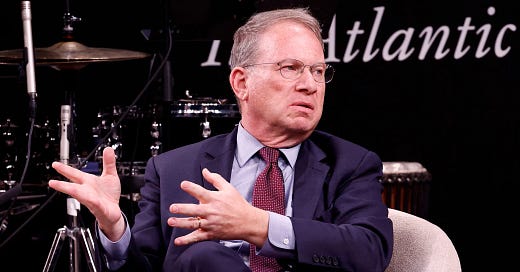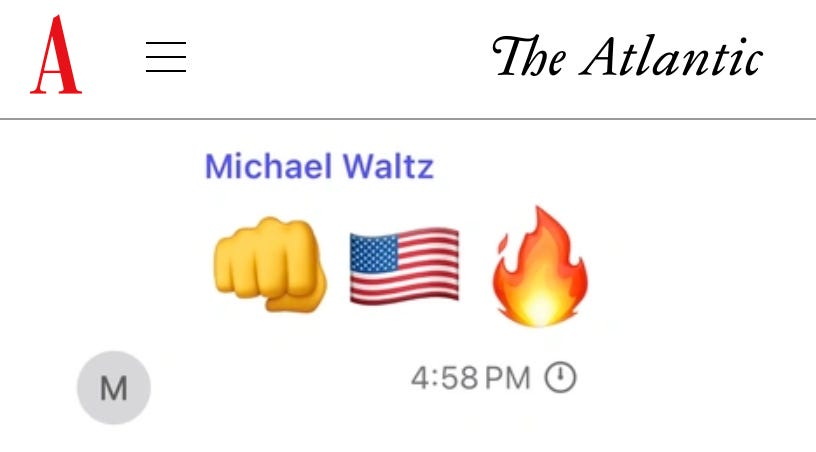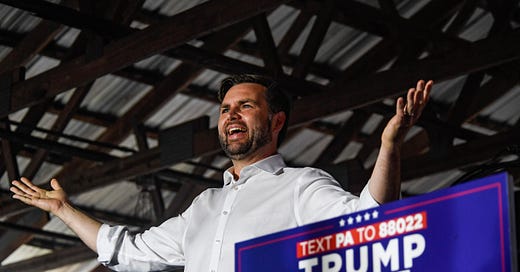The Atlantic announced today that its editor was inadvertently added to a group text including the Vice President, CIA Director, Secretary of Defense and National Security Advisor where they discussed Yemen war moves and other matters of national security. The Trump administration’s carelessness would soon be outdone by the squeamishness of the magazine.
Editor-in-chief Jeffrey Goldberg took the scoop of a lifetime and chose to act as gatekeeper, publishing only the most innocuous tidbits like what emojis different officials used and their goofy backslapping instead of the actual news. It is one of the worst cases of media paternalism, what I call highchair journalism — open up for your infotainment, here comes the airplane: Trump officials used emojis, LOL! — but also a disturbing reminder of how much the mainstream media have been co-opted by the national security state.
“I will not quote from this … or from certain other subsequent texts,” the Atlantic’s editor-in-chief Jeffrey Goldberg wrote of the Trump administration messages to which he was privy. “The information contained in them, if they had been read by an adversary of the United States, could conceivably have been used to harm American military and intelligence personnel, particularly in the broader Middle East, Central Command’s area of responsibility.”
He sounds more like a Pentagon spokesman than a journalist dedicated to informing the public.
In three separate instances, The Atlantic describes the emojis being used by different Trump officials (in one case even providing a screenshot). Quoting from the article:
“Two other users subsequently added prayer emoji.”
“Not long after, Waltz responded with three emoji: a fist, an American flag, and fire.”
“‘Steve Witkoff’ responded with five emoji: two hands-praying, a flexed bicep, and two American flags.”
These low calorie gotchas are often the only information major media types like Goldberg think is safe for public consumption.
As readers of this newsletter know, I think people are mature enough to handle difficult truths. That’s why I’ve published documents other outlets refused to, from the JD Vance Dossier to the Luigi Mangione manifesto. I was vilified for facilitating copycat murders that never materialized, foreign influence operations that didn’t work (Vance is now Vice President), and for being generally “irresponsible.”
To me, what’s irresponsible is the national security state’s gradual creep into civic life — including, apparently, journalism. Obvious as that seems, I’ve paid a personal price for acting on my belief that my primary duty as a journalist is to inform the public. I’m never going to appear in a top White House official’s contacts list like Goldberg did, or score an exclusive interview with one of them or an invite to a black tie event. So I get why people like Goldberg do what they do. But we shouldn’t pretend it’s about protecting our national security.
Here’s what happens whenever a leak not authorized by the government hits the desk of some national security auxiliary. The normal standard for publication — is it newsworthy? — goes out the window as the reporter or their outlet scrambles to find out how the story might affect their own interests. Would publication piss off someone in power or otherwise jeopardize access to officialdom? Could it aid some nefarious actor somewhere? Could it contradict our previous reporting?
We have a very recent, high-profile example of the danger of these types of questions in the media’s refusal to cover former President Joe Biden’s health decline last year.
Asking if a story is in the “national security” interest rather than the public interest turns the media into self-appointed counterintelligence officers, an army of paranoid James Jesus Angletons seeing Russians around every corner. Goldberg’s reference to “harm” to American military and intelligence personnel is the exact same excuse wielded by the national security agencies to evade transparency. (In this week’s revelation of the Kennedy assassination papers, what struck me most is how, more than 60 years later, the CIA was still using the national security harm argument to control what the public can know.)
Goldberg makes clear in his article that his standard for publication isn’t newsworthiness, but the mere possibility that the information “could conceivably” be used by adversaries of the United States. The media isn’t or shouldn’t be in the business of helping the government. Like an attorney, the media are supposed to have a duty to their client, the public.
Consider how Goldberg describes his decision to not publish a text sent by CIA Director John Ratcliffe based merely on the possibility that the information “might be interpreted as related to” ongoing intelligence matters:
“Then, at 8:26 a.m., a message landed in my Signal app from the user “John Ratcliffe.” The message contained information that might be interpreted as related to actual and current intelligence operations.”
That’s exactly the kind of news the public needs. Is the Houthi campaign cover for a broader war with Iran? How serious is the Trump administration’s consideration of the effects? Or the potential for escalation? Or the potential for any kind of success?
We’re going to let Jeffrey Goldberg decide. And when he does, no doubt his “interpretation” of the texts (we won’t get the originals) will reflect all of the concerns of the national security agencies and prioritize the interests of the Washington pooh-bahs rather than the public.
All of the rest of the national security auxiliaries are already anointing Goldberg for his supposed heroism today. “Kudos to @JeffreyGoldberg for treating the info more carefully than apparently the ‘principles’ overseeing US security,” Pulitzer Prize winning Washington Post reporter Carol Leonnig said on X today.
Nauseating. Help me prioritize the public interest above supposed national security interests by becoming a paid subscriber.
— Edited by William M. Arkin
















Let’s not forget Jeffrey Goldberg was one of the great cheerleaders for the invasion of Iraq based on completely debunked WMD claims. So he’s never really been anything other than a nat sec plant
Ken, journalists who hold power to account are on the wane. Keep doing you and let the others power up the clown car that is now our government.